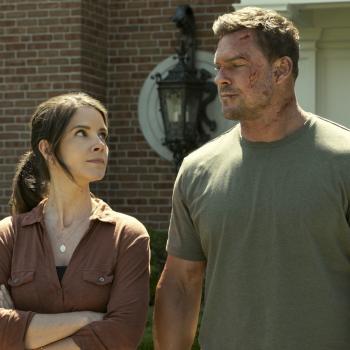Review of The Expendables 3, Directed by Patrick Hughes
I was tempted, as an experiment in criticism, to write a review of The Expendables 3 before I even saw the film, just to see how much I’d have to revise it.
As it turns out, I wouldn’t have had to do much. The third installment of the Expendables sticks to the tried and true formula of the previous ones, which embody the formula of the American action movie to a tee.
At this point, I could go on for a couple hundred words about how cliché and predictable these movies are. I could look down at my nose at Hollywood studios dumping millions into these sorts of projects when there are surely much better stories out there to be told. But I’ll leave that to other critics. Instead, I’ll try to tout the film’s virtues. It may be formulaic, predictable, and cliché, but in making the Expendables, Sylvester Stallone is crafting odes to the legacy of American action heroes. Why not sit back and enjoy the song in all its explosive, armored, muscular glory?
“Old soldiers never die; they just fade away,” said General MacArthur in his farewell address to Congress. The Expendables 3 confronts a similar sentiment in a way that must strike near the hearts of its cast – what future is there for men of war? After its usual opening action sequences, we see that Expendables leader Barney Ross (Stallone) has hung up all the dog tags of fallen brothers in arms in his airplane. After another one of The Expendables is nearly killed by Conrad Stonebanks (Mel Gibson) to get revenge on Barney, he decides to disband the old team. A life of fighting this late into life will only end with unremembered, premature graves, he reasons.
Likewise, in a real life way the heroes that lit up American cinemas in the 70s, 80s, and 90s are well past their prime. It probably isn’t unfair to suspect that Stallone, Statham, Schwarzenegger, Li, and others among the older cast have faced various existential crises about their place in this world as men decades younger step into a spotlight that used to be focused on them. Implicit in The Expendables is nostalgia for the days when the good guys simply busted the doors down and came in with guns blazing or fists flying, as Barney suggests to his new team of young recruits. But now in the era of cyber warfare, the ability to hack security systems and pilot drones often goes farther than good aim and martial arts. Figures like Julian Assange and Edward Snowden capture the spirit and imagination of the age more than Bond or Rambo or Indiana Jones.
Indeed, in an age when the soldiers most vital to our defense inflict their damage from behind computer screens, The Expendables is a reminder that men, at their core, are still creatures of violence. And this impulse is not always misguided. Orwell or Churchill may never have said verbatim that “We sleep safely in our beds because rough men stand ready in the night to visit violence on those who would harm us,” but it befits a man like Barney Ross.
Real life, of course, usually isn’t quite so clean cut as a bunch of U.S. -paid crack commandos going after a mass murderer at the helm of a rogue nation’s army. But the principle stands at the center of America’s “God and guns” ethos. It has been upheld time and again in our stories, and here Stallone pays homage to it.
To use a biblical analogy, some movies find David facing off against Goliath, assuming kingship after being hunted by Saul, killing Uriah to commit adultery with his wife, or confronting the treachery of Absalom. Other times, they find David’s mighty men bringing a load of hurt to the bad guys. I suppose sometimes those stories are worth telling too.











